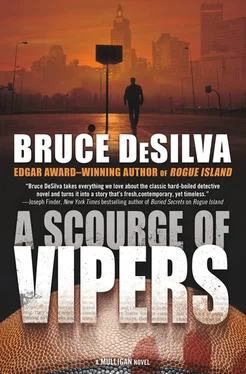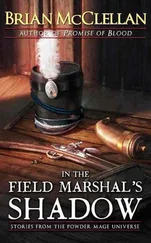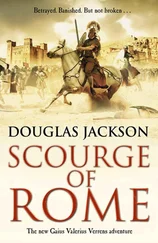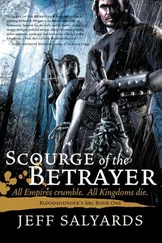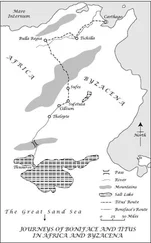“Oh, he was there, all right.”
“And the briefcase full of cash?”
Wargart and Freitas didn’t answer. I glanced at Parisi. He shook his head no.
“Alfano’s in custody?” I asked.
“Not exactly,” Wargart said.
“Don’t tell me you let him go,” I said.
Wargart and Freitas smirked and exchanged glances.
“Romeo Alfano is in the morgue,” Parisi said.
“Aw, hell.”
“And you,” Wargart said, “are the last person to see him alive.”
With that, he rose, ordered me to stand, told me to empty my pockets, and pulled my hands behind my back.
“There’s no need to cuff him,” Parisi said.
Wargart slapped the bracelets on anyway. Chuckie-boy looked on stone-faced again as the three detectives led me out. This was getting to be a habit.
At Providence police headquarters, Wargart and Freitas sat across the table from me and hurled questions. Parisi, arms folded across his chest, leaned against the wall and silently observed. From the interrogation, I deduced that Alfano was found dead on his hotel room couch, shot twice in the chest and once in the head.
“We found a cigar in a wineglass,” Freitas said. “Same brand you tossed on the table when you emptied your pockets. Pretty careless of you to leave it at a murder scene.”
“Wasn’t a murder scene when I left,” I said.
“Bullshit,” Wargart said.
“It was Mario,” I said, “and now he’s on the run with a couple of hundred grand in hundred-dollar bills.”
“Blaming the zombie again, huh?” Wargart said. “Where did you stash the money, asshole?”
That rattled me. I nearly blurted out that McCracken could back up my story. But it wouldn’t be right to involve him without making sure he was going to be okay with it. For now, I kept my hole card hidden and invoked my right to an attorney.
When Yolanda bustled in, she told the cops to get out and had me fill her in. Then she summoned Wargart and Freitas and demanded that they charge me or release me.
“We can hold him for twenty-four hours,” Freitas said.
So they stuck me in a holding cell till late the following afternoon.
* * *
When I finally got home, I found Joseph doing housework again.
“The cops?” I asked.
“Yeah. They showed me a search warrant and tossed the place. Threw stuff all over the fuckin’ floors. Made a hell of a mess.”
“They take anything?”
“Your nine mil.”
“Anything else?”
“They took a grocery bag out of the bedroom, but I got no clue what was in it. What’s going on, Mulligan?”
I spilled just enough to satisfy him.
Then I spent an hour trying to figure out what could have been in that grocery bag. Far as I could tell, the Kel-Tec was the only thing that was missing.
“I’ve been dreaming about us having breakfast together after a night of unbridled lust,” I said, “but fending off a gangbanger hell-bent on a jail-cell blowjob wasn’t the lust I had in mind.”
“Are you okay?” Yolanda asked.
“Better than the gangbanger. He should see a dentist about those teeth.”
“Your meeting with Romeo Alfano didn’t go as planned either,” she said.
“It didn’t.”
We were seated in a booth at Charlie’s, I with my customary bacon and eggs and Yolanda with a grapefruit half and a cup of coffee.
“One thing I’m not clear on,” she said. “Why did you tell Mario what Alfano was up to?”
“I wanted to drive a wedge between them. But I didn’t figure on Mario whacking the guy.”
“Feeling guilty about that?”
“Not especially.”
“You have to promise me something.”
“What?”
“If you get picked up again, you’ll call me immediately and not answer any more questions.”
“Maybe.”
“No maybes this time.”
“Okay. You win, Yolanda.”
“They ran ballistics on your pistol and determined it wasn’t used to kill Alfano.”
“Good to know. Can you get it back for me?”
“I’m working on it. You know, for a newspaper reporter, you sure get into a lot of trouble.”
“Always have.”
“Why is that?”
“Trouble is my business.”
“I think I heard that line somewhere before.”
“It’s the title of a Philip Marlowe short story by Raymond Chandler.”
“Marlowe was a private detective,” she said, “so trouble was his business. The business of a journalist is to report the news.”
“You really want to get into this?”
“I do. And none of your jokes.”
I drained my coffee and waved Charlie over for a refill.
“You know how most reporters spend their days, Yolanda?”
“Tell me.”
“They regurgitate lies spewed by politicians. They interview self-serving celebrities. They write features about the nutty lady who has fifty cats or the coot who’s amassed the state’s largest ball of string. And they cover public meetings as if they matter, creating the illusion that democracy is going on.”
“Isn’t it?”
“Of course not. When the political stakes are high or there’s big money to be made, deals are cut out of sight over whiskey and cigars. Or sometimes, cocaine. Journalists try to convince themselves that their jobs are noble and exciting, but mostly the work is pointless and boring.”
“If that’s how you feel, why’d you get into it in the first place?”
“Because it wasn’t always this way,” I said. “In the good old days, which weren’t all that long ago, the job was a license to dig out the truth behind the facade, to expose incompetence and corruption, to explain how the world really works. Now, outside of a few big-city metros like The Washington Post and The New York Times , news organizations don’t have the staff-or the balls-to do much of that anymore. Hell, even the big boys don’t do as much of it as they used to.”
“So you’re a dinosaur,” she said.
“That’s what my boss keeps telling me.”
“But he lets you keep at it?”
“No, he doesn’t. He buries me in press releases and assigns me to write weather stories about stuff readers could find out for themselves if they looked out the window. The velociraptor act is on my own time now.”
“Does he know what you’ve been up to?”
“I haven’t got around to telling him.”
“Why not?”
“Because he’d order me to stop.”
“Maybe it’s time you confided in him,” she said.
“Why would I want to do that?”
She picked up her cup and sipped some coffee before deciding how to answer.
“Usually, I tell murder suspects to keep their mouths shut,” she said, “but most of them don’t have the big megaphone you’ve got to get your story out. I think your best move now is to get out ahead of this.”
“How do you suggest I do that?”
“By putting what you know about the Alfanos, the bribery, and the Templeton murder in the paper.”
“I don’t have it nailed down yet.”
“Are you close?”
“That depends.”
“On what?” she asked.
“On whether I can talk a few reluctant sources into going on the record.”
Charlie dropped the check on the table. I beat Yolanda to it and threw down a twenty. The Capital Grille was out of my price range, but I could spring for half a grapefruit without taking out a loan.
“How about dinner later this week?” I said.
“I don’t think so.”
“Oh. Did I say something stupid again?”
“It’s not that.”
“What, then?”
“The things you told me last time? That stuff about why you value the differences between us?”
“Yeah?”
“I’m still thinking about it.”
Читать дальше
